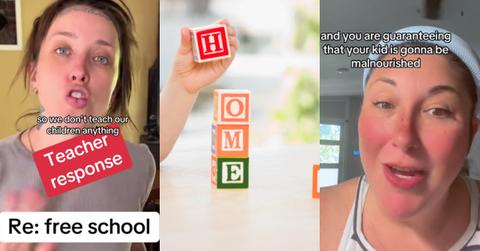“We Don’t Teach Our Children Anything”: Mom Embraces Unschooling — but Gets Slammed by Teacher
“As a parent, you need to be very, very careful of who you are listening to on this app.”
Published June 21 2024, 1:46 p.m. ET

In a recent TikTok video that’s caused quite a stir, teacher-author Teresa (@teresakayenewman) responded to a mother advocating for "unschooling" — an unconventional educational approach that has been gaining traction. Teresa’s video, critiquing the face-tatted mom’s "unschooling" philosophy, has leaped past the 500K view mark, sparking thought-provoking discussions about the merits and drawbacks of this controversial method.
Unschooling, a concept popularized by educator John Holt in the 1970s, emphasizes learning through life experiences, personal interests, and everyday activities rather than a formal curriculum. This approach allows children to pursue their natural curiosities with parents acting as facilitators rather than traditional educators.
While unschooling is a branch of homeschooling, it differs significantly by eschewing structured lessons and schedules. In the U.S., approximately 7 percent of K-12 students are homeschooled, with 10–20 percent of these families practicing unschooling, translating to around 370,000 to 740,000 students.
Teresa’s TikTok video critiques the unschooling method in a call-and-response style. She begins by addressing the unschooling mom’s claim that “We don't teach our children anything.” Teresa responds, “That's a pretty embarrassing thing to admit, but I'm going to hear you out because you seem pretty confident.”
The unschooling mom continues, “Everything that they learn is in response to either their interests or their questions.” Teresa humorously counters, “I plan on feeding my kid the exact same way. I'm just going to feed him fruit and cheese puffs; otherwise, he's going to throw a fit. A kid will fail to thrive if we leave them to decide what is best for them.”
As the video progresses, the unschooling mom explains, “We have no curriculum, we have no school hours.” Teresa responds with skepticism, “I wouldn't necessarily expect a parent with your educational philosophies to have a set curriculum and schedule, but maybe just a loose list of knowledge and skills that you would want to see your kids hit every year.”

Teresa’s pointed remarks continue as she warns, “You are guaranteeing that your kid is going to be malnourished, overstimulated, and uneducated ... What you're doing is you're limiting your child's ability to learn anything outside of their own tangible environment.”
The unschooling mom’s approach of letting children lead their learning journey drew sharp criticism from Teresa, who asserted, “Believing your child has a finite amount of cognitive real estate is pretty telling, don't you think? You'd be surprised what your child would be capable of if you weren't holding them back.”
In her conclusion, Teresa expresses concern, saying, “You need to be very, very careful as a parent of who you are listening to on this app.”
The video has prompted a wave of reactions on TikTok, as recent debates about education in America have reached a fever pitch.

One user shared their personal struggle with unschooling: “Hey, I was raised the EXACT way she is raising her kids! I'm 27 years old and can't do multiplication, division ... it's taking me close to seven years to get a nursing degree because of the educational handicap.” Another user praised traditional schooling, saying, “My son decided to become a pilot when he was forced to read a book about airplanes in fourth grade. If not for school? He’d not be a pilot.”
Others questioned the legalities, with one remarking, “It's so strange to me that in the U.S. you're not obligated by law to send your kids to school.”
Unschooling remains a highly contentious topic vs. traditional education methods. Advocates believe it promotes self-directed learning tailored to a child’s interests, fostering independence and critical thinking. However, critics, including Teresa, worry about gaps in essential academic skills and whether unschooling adequately prepares children for standardized tests, college, or future employment.

These debates come at a time when the American education system is facing significant challenges. Recent data reveals troubling trends, such as declining academic performance and the lowest math and reading proficiency scores in decades for 13-year-olds. Critics argue that the system's structural flaws — such as outdated teaching methods and inequities in resource allocation — are deep-seated and require comprehensive reform.
A Pew Research Center survey highlights that over half of Americans believe K-12 education is headed in the wrong direction, echoing sentiments that the system may be "broken."
Despite the growing popularity of unschooling, it’s clear that this approach to education is far from universally accepted. Whether it’s seen as a bold move toward personalized learning or a risky departure from educational norms, the debate over unschooling continues to ignite passionate responses from parents and educators alike.